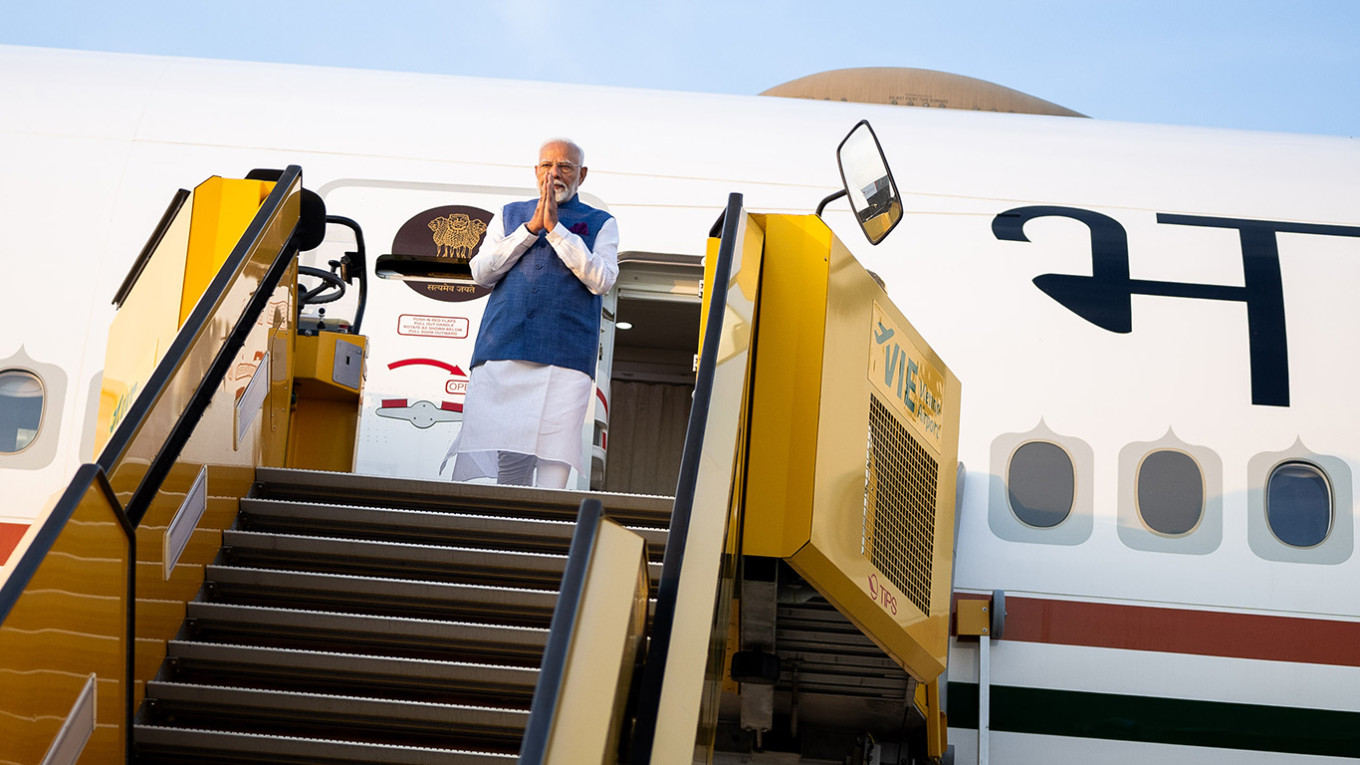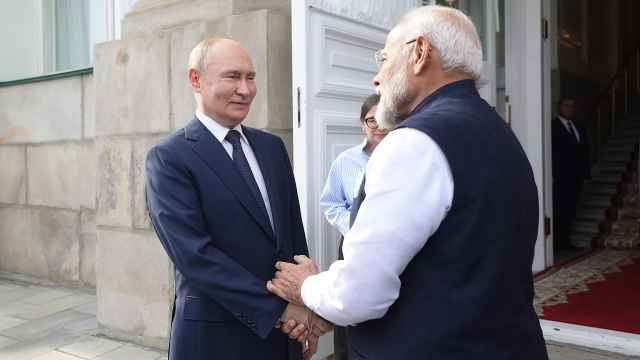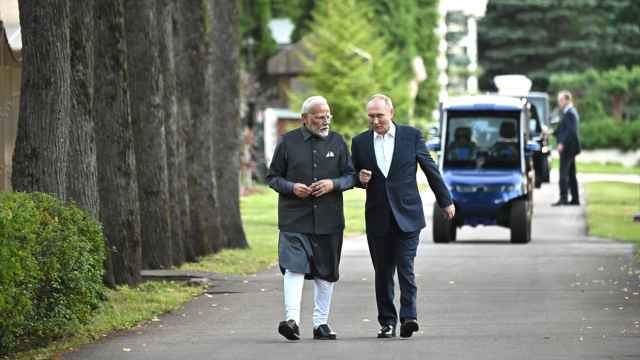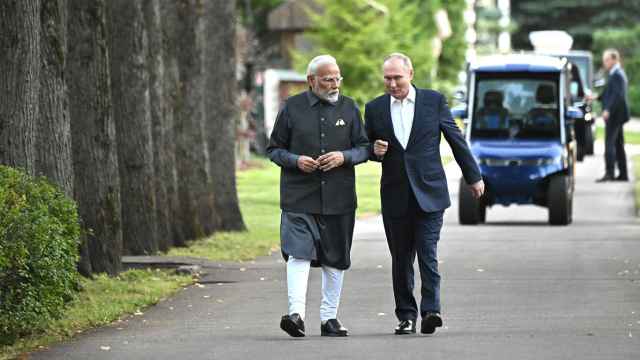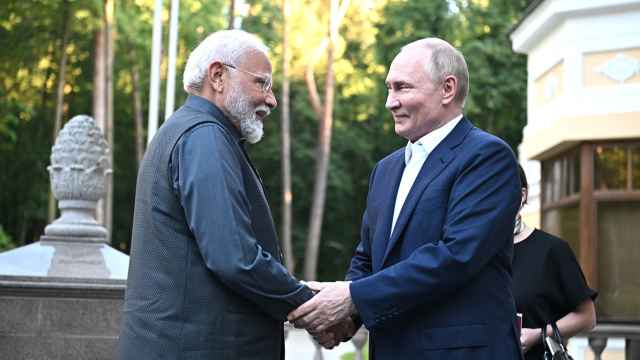Indian Prime Minister Narendra Modi will arrive in Ukraine on Friday following a two-day trip to Poland commemorating the 70th anniversary of Indo-Polish bilateral ties.
But while Modi’s visit could be seen as a gesture of support for Kyiv as it defends against invading Russian forces, it’s worth remembering that he visited Moscow in early July after being re-elected for a third term — a move widely seen as him thumbing his nose at the free world. His bear-hug embrace of President Vladimir Putin, even as the largest children’s hospital in Kyiv was under attack, was described by Ukrainian President Volodymyr Zelensky as “a huge disappointment and a devastating blow to peace efforts.”
Interestingly, Modi is traveling to Kyiv not as a mediator but as a messenger. His “perspective-sharing” agenda is being telegraphed to tamper expectations among Western allies who have urged India to use its cordial relationship with Russia to help end the conflict. Besides his high-wire, Orban-esque shuttle diplomacy making waves domestically, Modi is trying to come across as even-handed by showing up on the territory of both warring sides within a matter of months. That said, the 20-hour train journey he is set to embark on suggests that his meeting with Zelensky is not solely about optics.
Whether by design or unwittingly, India, the world’s largest democracy, remains one of the key enablers of Putin’s “special military operation.” Despite reducing its dependence on Russian-made artillery — which now accounts for 36% of its total arms imports, down from 65% before 2020 — India shows little interest in disrupting its purchase of discounted Russian hydrocarbons. In fiscal year 2023, India became the second-largest consumer of Russian fossil fuels, spending $37 billion on crude oil — roughly 13 times its pre-war expenditure. And last month, India surpassed China as the top importer of Russian oil, Reuters reported.
India has also doubled its diamond purchases from Russia in the first quarter of 2024, openly defying the United States and the European Union. Admittedly, middle powers like India have been afforded significant leeway to navigate between the Western bloc and the Eurasian nexus under the guise of “strategic autonomy.”
Putin, in pursuing his vision for a “new world order,” is keen to deepen the partnership between Moscow and New Delhi beyond the latter’s defense and energy needs. However, Russia has little to offer its “dear friend” other than heavily discounted commodities and subpar weaponry.
Having joined the Shanghai Cooperation Organization (SCO) in mid-2017 at Russia’s behest, India is beginning to question what benefit it has gained from full-fledged membership in the regional bloc. Modi’s no-show at the 24th SCO summit in Astana this summer speaks volumes about his disillusionment with the Sino-led group that includes arch-rival Pakistan.
India is experiencing a similar case of buyer’s remorse with BRICS+, where an expected intake of predominantly Muslim nations at the upcoming summit in Kazan this October could leave India, led by a Hindu nationalist who has moved closer to Israel during the Gaza war, isolated if the bloc shifts toward an anti-Israel stance by admitting aspirants such as Turkey and Malaysia.
Additionally, ongoing challenges in “de-dollarization” efforts have led to payment issues and mutual distrust between India and Russia in transactions using local currencies.
India’s foreign policy under the ruling Bharatiya Janata Party (BJP) has been driven by an inferiority complex of sorts toward its vastly wealthier and more resource-rich neighbor, China. Even in its “time-tested” relationship with Moscow, New Delhi understands that it will always play second fiddle to Beijing in the Kremlin’s eyes. The Chinese-brokered détente between longtime foes Iran and Saudi Arabia in March 2023, along with the recent Fatah-Hamas unity agreement, has put pressure on India to achieve a diplomatic breakthrough of equal or greater magnitude.
Putin’s refusal to engage in direct negotiations with Zelensky, especially after the recent Kursk incursion, underscores the need for Modi to take a more proactive role in pursuing peace. Leaving Kyiv empty-handed will lead the international community to question the sincerity of India’s commander-in-chief, who has previously stressed that “no solution can be found on the battlefield” and famously told his Russian counterpart that “this is not an era of war” in Samarkand in 2022. As the leader of a rising, nuclear-armed power, Modi cannot afford to rely solely on rhetoric and political posturing.
Failure to deliver meaningful results will only fuel speculation that Modi is throwing his hat in the ring for self-serving purposes. His tenure has been marked by significant democratic backsliding and disregard for the rule of law. According to the latest press freedom index by Reporters Without Borders (RSF), India ranks 159th out of 180 countries. Its abysmal human rights record on Modi’s watch has not gone unnoticed in the West either. Much like Hungarian strongman Viktor Orban, Modi is masquerading as a force for good to rehabilitate his global image and score brownie points with the pro-Ukraine camp.
A Message from The Moscow Times:
Dear readers,
We are facing unprecedented challenges. Russia's Prosecutor General's Office has designated The Moscow Times as an "undesirable" organization, criminalizing our work and putting our staff at risk of prosecution. This follows our earlier unjust labeling as a "foreign agent."
These actions are direct attempts to silence independent journalism in Russia. The authorities claim our work "discredits the decisions of the Russian leadership." We see things differently: we strive to provide accurate, unbiased reporting on Russia.
We, the journalists of The Moscow Times, refuse to be silenced. But to continue our work, we need your help.
Your support, no matter how small, makes a world of difference. If you can, please support us monthly starting from just $2. It's quick to set up, and every contribution makes a significant impact.
By supporting The Moscow Times, you're defending open, independent journalism in the face of repression. Thank you for standing with us.
Remind me later.


